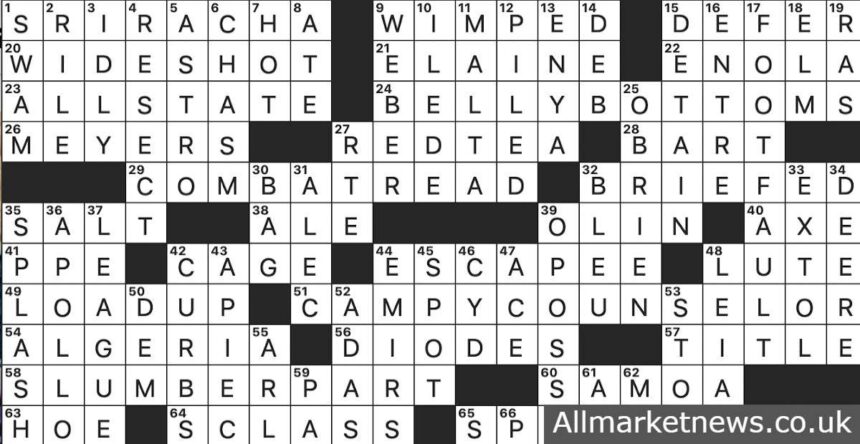|
Getting your Trinity Audio player ready... |
Introduction to Buck in Slang Nyt Crossword
Are you a crossword enthusiast looking to crack the code on some tricky slang terms? If so, you’re in for a treat! In today’s blog post, we’ll delve into the intriguing world of New York Times crossword puzzles and focus on one particular puzzling term: “Buck in Slang.” So grab your pencil and get ready to sharpen your skills as we unravel the mysteries behind this elusive clue. Let’s dive in!
The Clue: Buck in Slang Nyt Crossword Puzzle
Are you a crossword enthusiast looking to crack the latest New York Times puzzle? If so, you might have come across the clue “Buck in Slang” and found yourself scratching your head. Well, fear not, because we’re here to shed some light on this tricky term.
In the world of crosswords, slang terms can often leave puzzlers stumped. “Buck in Slang” may seem vague at first glance, but with a bit of creativity and wordplay, you can unlock its meaning. It’s all about thinking outside the box (or should I say grid?) when tackling these types of clues.
So what exactly does “Buck in Slang” refer to? Without giving away any spoilers, let’s just say that this term is related to money and has a colloquial twist to it. Once you make that connection, solving the puzzle becomes a whole lot easier.
Stay tuned as we delve into possible answers for “Buck in Slang” and share some valuable tips for cracking those cryptic clues!
Possible Answers for “Buck in Slang Nyt”
If you’re stuck on the clue “Buck in Slang Nyt” while tackling your New York Times crossword puzzle, fear not! There are a few possible answers that might fit the bill. One option could be “Clam,” which is slang for a dollar. Another contender could be “Greenback,” another term used to refer to U.S. currency.
Alternatively, you might consider “One Spot” as a potential answer for this slangy clue. This term also alludes to a single dollar bill and could be the solution you’re looking for.
Remember, solving crossword puzzles often involves thinking outside the box and considering various interpretations of clues. So don’t get discouraged if one answer doesn’t immediately come to mind – keep brainstorming different possibilities until you find the perfect fit for “Buck in Slang Nyt.”
Tips for Solving Crossword Puzzles with Slang Clues
Solving crossword puzzles with slang clues can be both challenging and fun. To tackle these tricky terms, it’s essential to think outside the box. One tip is to consider the context of the clue – slang words often have nuanced meanings that might not be immediately apparent.
Another helpful strategy is to keep an open mind and brainstorm different interpretations of the slang term. Don’t get too fixated on a single definition; sometimes, a more unconventional meaning could be the key to cracking the puzzle.
Additionally, familiarizing yourself with common slang expressions can give you a head start when faced with similar clues in future puzzles. Reading up on contemporary colloquialisms or following popular culture trends can help expand your slang vocabulary.
Remember, solving crossword puzzles is as much about creativity and lateral thinking as it is about language skills. So embrace the challenge of deciphering those sneaky slang clues!
Other Commonly Used Slang Terms in Nyt Crossword Puzzles
If you’re a fan of solving Nyt Crossword Puzzles, you’ve likely encountered slang terms that can stump even the most seasoned solvers. These puzzles often feature trendy and contemporary language to keep solvers on their toes.
Slang terms like “Lit” for something exciting or cool, “Fam” referring to close friends or family members, and “Slay” meaning to do something exceptionally well are commonly used in Nyt Crossword Puzzles. It’s essential to stay up-to-date with these modern expressions to tackle clues more effectively.
Additionally, phrases like “On Fleek” meaning perfectly styled or looking flawless, “Tea” for gossip or juicy information, and “Woke” signaling social awareness are also prevalent in Nyt crossword puzzles. Familiarizing yourself with these slang terms can give you an edge when deciphering tricky clues.
So whether you’re a casual solver or a dedicated enthusiast, expanding your knowledge of current slang can enhance your crossword-solving skills and make the puzzling experience even more enjoyable.
You Might Also Like:
- Becomes Damaged Like Wood NYT Crossword Clus And Answers
- Bit of Indian Music NYT Crossword Clue And Answers
- Begin to Cry NYT Crossword Clue And Answers
Conclusion
In the world of crossword puzzles, deciphering slang terms like “buck” can sometimes be challenging but ultimately rewarding. The New York Times Crossword often features such colloquial language to keep solvers on their toes and enhance the puzzle experience.
By understanding that “buck” in slang refers to a dollar, you can approach similar clues with more confidence. Remember to use context clues and think creatively when tackling these types of hints.
So, next time you come across “buck” or other slang terms in the NYT Crossword Puzzle, embrace the challenge and enjoy unravelling the linguistic creativity woven into each clue. Happy puzzling!
